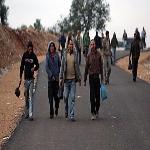13 May 2010

Photo: AFP
Palestinian workers arrive at dawn at the Nilin Israeli checkpoint, between the West Bank and the Jewish settlement of Modiin Illit. (File)
It is six in the morning and the sun is starting to rise at a checkpoint in the West Bank next to the Israeli settlement of Modi'in Illit. Lining up at a fence surrounding the settlement are hundreds of Palestinian men, including 40-year-old Younis Salah from the West Bank town of El-Khader, near Bethlehem.
Salah lines up here every morning, waiting to cross into the settlement to work his shift as a construction foreman. His reason for working on the settlement is simple.
He says he works on a settlement because he needs to feed his children.
Salah is one of an estimated 21,000 Palestinian workers whose hands are building new homes in places like Modi'in Illit - Jewish settlements that Palestinian leaders claim are encroaching on West Bank lands, impeding the creation of a Palestinian state, and creating a major sticking point in the Middle East peace process.
The Palestinian leadership has banned working on settlements, saying that any Palestinian who participates in the building of settlements is helping the enemy.?
"It's a process. We're moving very fast toward separation from Israel," said Abdel Hafiz Nofel, deputy economy minister of the Palestinian Authority. "We believe that with the settlers and the settlements, there is no way to live together."
Salah, the construction worker, says that morning after morning, he lives a paradox.
He says this is his ironic fate. He says the Israelis - in his words - took the land of Palestinians like himself, and he is working on their settlements. He says that even if he wanted to look for work in Arab countries, Israeli travel restrictions would prevent him from going there. He says he has no choice but to work on a settlement.
It is the larger earnings and steady work - which are hard to find in the West Bank - that drive Palestinians like Salah to work on the settlements.
Salah estimates his earnings are double what they would be in the West Bank, if he even found a job there.
His earnings at the settlement enable him to provide his family with a comfortable life. Their home in El-Khader is spacious, clean, and well-furnished.
The family has just welcomed their latest addition, a newborn daughter.
They also have a five-year-old daughter who is disabled and gets no benefits from the Palestinian Authority. Salah is able to pay the full cost of expensive therapy for her.
Salah's wife, Ahlam, says she dreams of a Palestinian state free of Israeli occupation. But she says she must also face reality.
She says her husband is working on a settlement because there is no alternative. It is, she says, how he brings food to the table. Ahlam says the family wants to be comfortable, and she wants her children to live with dignity and not be humiliated.
Palestinian leaders say they hope to provide options for workers, but have so far come up with no concrete alternatives for those who will be unemployed as a result of the ban.
Putting tens of thousands of people out of work suddenly is cause for concern for the Palestinian Authority, and officials have said they will delay implementation of the ban for several months.
Younis Salah says it will take more than a command from Palestinian leaders to stop him from going to work at a settlement.
He says he will respect the authority, and he knows the leaders can enforce the ban if they want to. However, he says the only way they will be able to stop him is by force.
Until then, and in the absence of good job opportunities in the West Bank, the morning ritual of lining up to work on the other side of the fence will continue for Salah and thousands of others.